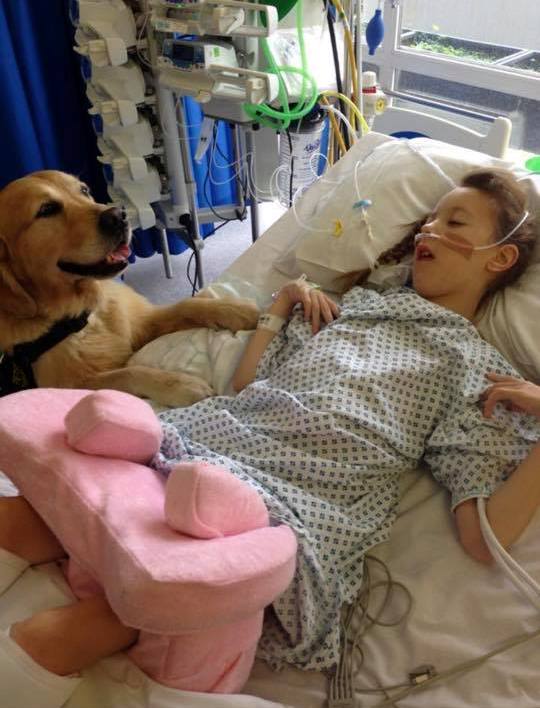Pioneering therapy dog study shows overwhelming support from staff and patients for nationwide rollout
Two hundred staff and parents were surveyed across a 12-month period, with results indicating the presence of dogs reduced anxiety in young patients when waiting for tests, investigations and examinations.
Children who were previously nervous around dogs reported less fear as a result of the visits and no concerns were raised in relation to the presence, cleanliness and behaviour of the dogs.
The research, published in the British Journal of Nursing, found there was a 100% recommendation that similar animal assisted intervention (AAI) services should be supported across the UK.
“While we had received constant positive anecdotal feedback from patients, families and staff, to really establish AAI in the healthcare setting we needed to strengthen the evidence behind it,” said Lyndsey Uglow, lead therapy dog handler at Southampton Children's Hospital, part of University Hospital Southampton NHS Foundation Trust.
"The results of this survey have confirmed that the initiation of a formal therapy dog service in an acute UK children’s hospital environment has been overwhelmingly positive and supported by patients, parents and staff.”
She added: “To ensure the safe development of a therapy dog service, handlers need to follow a well-researched and considered protocol to ensure safety for all concerned, including the dogs, but it can be done and there is a growing evidence base for it.
"We understand a therapy dog visit would not be appropriate for every type of patient however, where it is possible, the results of this study show that patients, staff and visitors enjoy the benefit of the human-animal bond when they see one of our dogs on the wards.”
The project was initiated and led by Lyndsey and fellow Pets as Therapy handlers Karen Ramsay, Hannah Ramsay and Liz Wilkinson with their therapy dogs Leo, Jessie, Milo, Hattie, Quinn and Archie.
Lyndsey, who holds a certificate in animal assisted therapy, activity and learning from the Institute for Human Animal Connection at the University of Denver, has been visiting patients at UHS with golden retrievers Leo, Jessie and Quinn three days a week for the past seven years.
She was the AAI adviser to the Royal College of Nursing for its Working with Dogs in Healthcare Settings protocol, which developed national guidelines published in May 2018.
Since the completion of the study, which was funded by The Humanimal Trust, this team of therapy dogs has also been used to support anxious paediatric patients prior to surgery with positive results and there are plans to launch a further study focusing on paediatric intensive care.
Lyndsey added: "The positive effects of AAI have been clear to me for such a long time and I am delighted the patients and staff who responded to the surveys have confirmed this.”
Joyce Stebbings, youth and play services manager at Southampton Children’s Hospital, who oversees therapy dog activities, said: "Working in partnership with our amazing team of dogs and their handlers has demonstrated the success for AAI in hospital as the dogs are naturally attuned to recognise when someone needs support or attention.
"This is more than the original Pets as Therapy model and offers additional support in helping our patients and their families reach a goal that, at times, seems unreachable.
"Our records of therapy dog activity show that the teams have visited more than 1,900 patients in a year, with AAI used more than 550 times here at the hospital and this number continues to rise."
